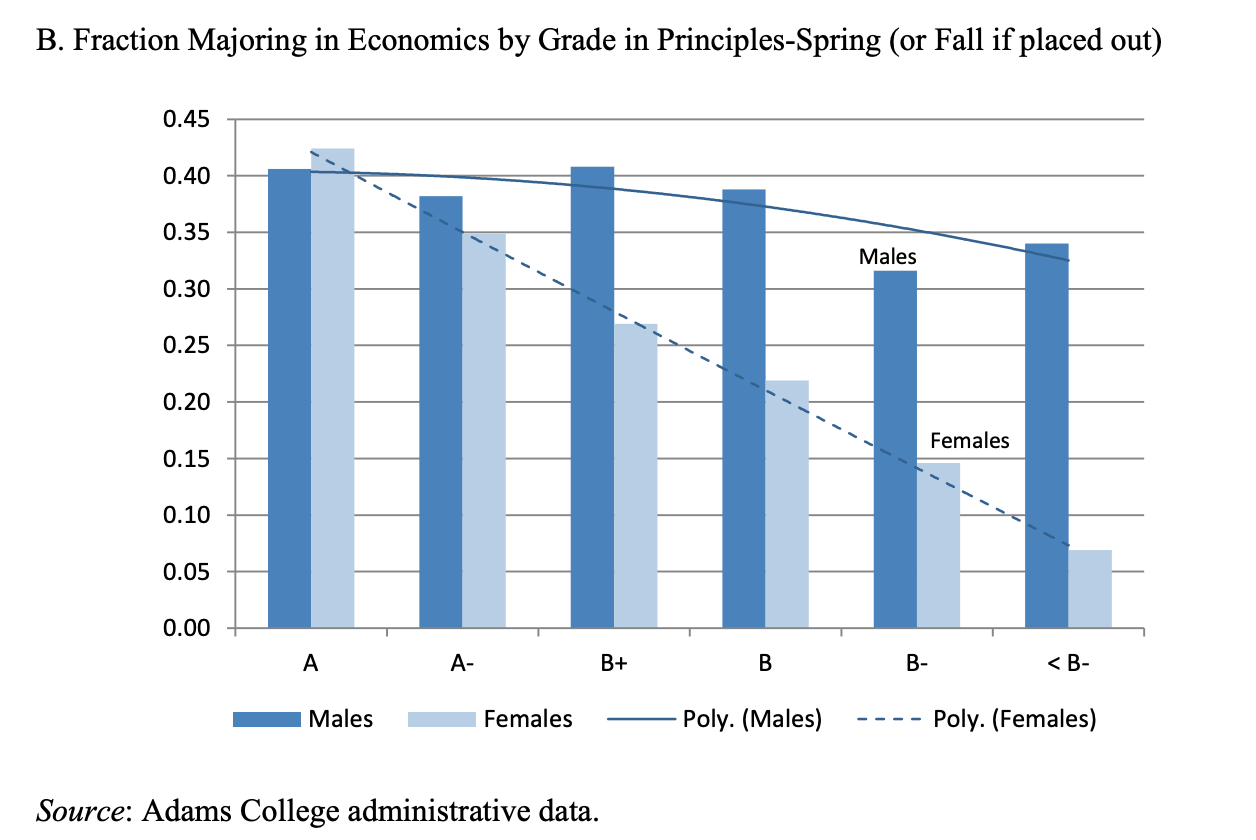
JENNIFER JACKSON – OCTOBER 12TH, 2020
EDITOR: AMANDA ZHANG
Over half of U.S college students are female, yet massive gender imbalances exist within several STEM related fields, including economics. A study conducted by Wellesley College in 2019 demonstrated that women are far less likely to gravitate towards math intensive fields, including computer science, engineering, and economics. But what is driving this disparity? Differences in math ability? A competitive atmosphere? Claudia Goldin, a Harvard economist, argues that it is the sensitivity to first year grades that drives women to flee from the economics major. Goldin’s analysis concentrated on Adams college, a private liberal arts college, which rivals the selectivity to institutions such as Amherst, Brown, Chicago, and Columbia. The study focused on the recent graduating class of economics majors and followed the outcomes of the students’ choice of majors.
Goldin found that for female prospective economics majors, their grades in “Principles of Economics” (or other course equivalents to “Econ 1”) was an influential determinant of whether they would choose to pursue the major. For instance, out of the students who earned a B+ in the course, 41% of the men chose to stick with the major, compared to only 27% of the women. This trend continues throughout the grading scale. Interestingly enough, according to Goldin’s study, men who earned a “B+” or an “A” had the “identical” probabilities of pursuing the major.

From the study, it is clear that women’s choice of major was heavily influenced by an early grade in “Principles.” We would expect to see a linear relationship (defined as slope = 1) between grade and probability of choosing to major in economics, yet for women, we see a much steeper slope (greater than 1) suggesting that changes in grades heavily impacted women’s choice of major. This “precarious slope,” suggests that changes in grades heavily impacted choice of major. We would expect to see a similar linear relationship between grade and probability for men, yet instead, we see a “gently sloping” trendline.
So what is the cause of these differences? Economics literature has put forward two main narratives Goldin claims Grades Signaling, while authors Figara and Speer claim Gender Choices. Figara and Speer acknowledge that women are more likely to leave STEM majors (including economics) but argue that women are “not fleeing science and math more than the men are. Rather they are fleeing competitive, difficult, male-dominated majors.” The topic of women in STEM is contentious, yet remains a critical focus of college admissions officers in top national universities. Figara and Speer are conclusive that low grades do “signal academics mismatch,” and “the lower the grades, the larger the switch in terms of course content.” But when women do leave STEM majors, Figara and Speer point out that switches “do not improve students’ grades. When students switch majors, they switch to majors that ‘look like them.’”
There are varied explanations to the grade sensitivity of women, and the literature does not point towards one single answer. One hypothesis is that earning lower grades causes women to reinforce negative stereotypes about their performance in math intensive fields (“I’m not an economics person.”) Another compelling point from Figara and Speer’s study shows that “higher ability” (characterized by grade point average at the end of the first academic year) women remain undeterred, while the women who did switch majors still remained in “science-intensive fields.” This suggests that leaving STEM may be more about the culture than the curriculum. There are a litany of hypotheses as to why women leave STEM fields, including economics, but academics generally agree that when students change majors, they seek out majors that match their own characteristics in terms of gender and race makeup. Moreover, grade sensitivity plays an important role within major switches: the lower the grades, the larger the switch. However, for the sake of intellectual curiosity and the broader advancement of society as a whole, Goldin and her team conclude, for women pursuing economics as a major: “persevere in the discipline, come hell or high water— or B-minuses.”
Featured Image Source: Belinda Hu
Disclaimer: The views published in this journal are those of the individual authors or speakers and do not necessarily reflect the position or policy of Berkeley Economic Review staff, the Undergraduate Economics Association, the UC Berkeley Economics Department and faculty, or the University of California, Berkeley in general.



